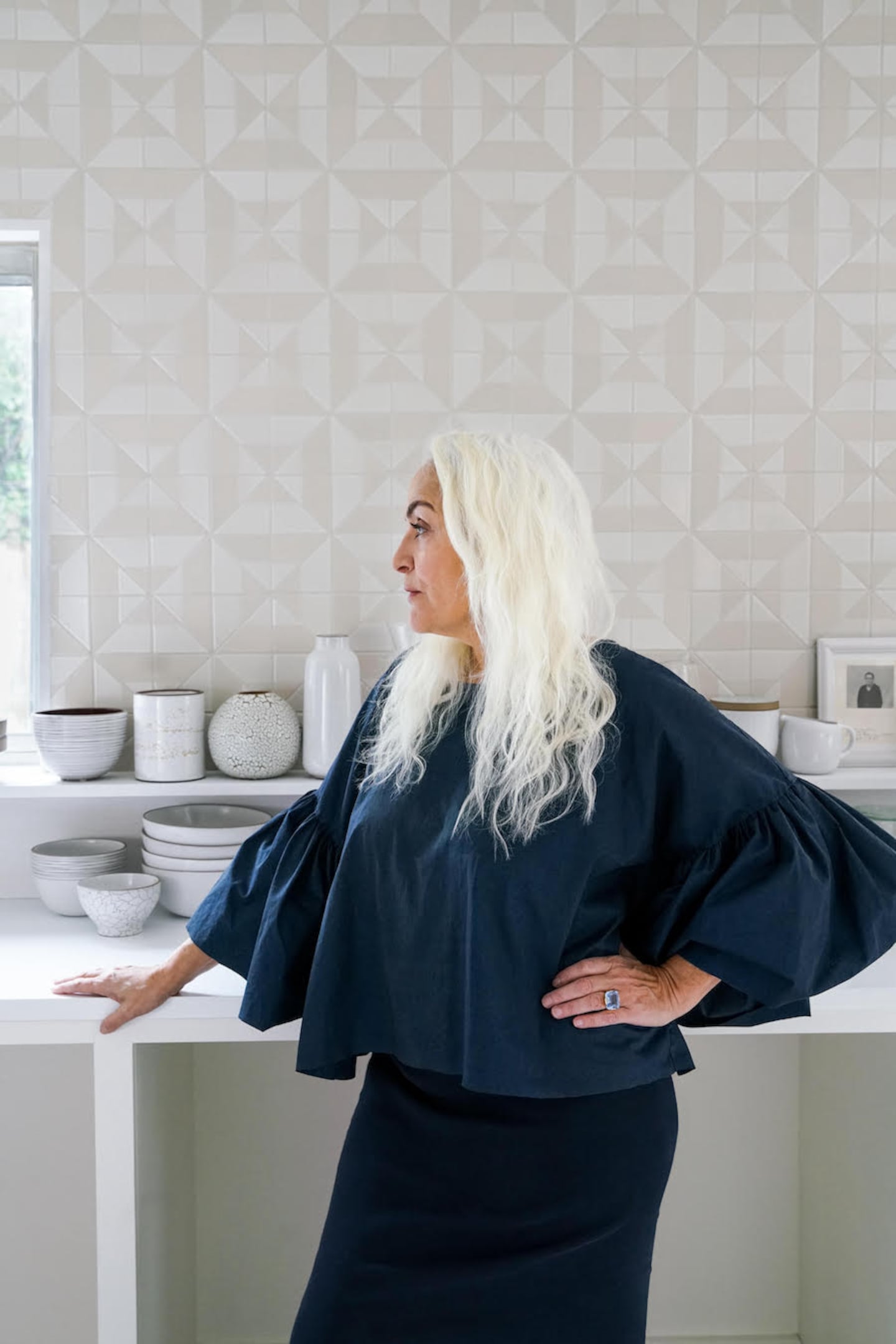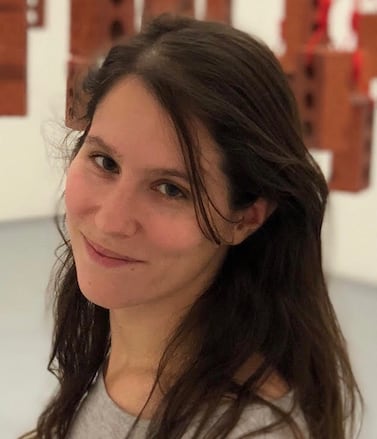
The Business of Fashion
Agenda-setting intelligence, analysis and advice for the global fashion community.

Agenda-setting intelligence, analysis and advice for the global fashion community.

A little over 20 years ago, Natalie Chanin cut up an old T-shirt, collaged it back together and wore it to a party in New York City.
Chanin, who was working as a stylist at the time, received so many compliments that she decided to make more one-of-a-kind tees to sell during New York Fashion Week. First, she called workshops in the city’s Garment District, but none were able to deliver the detailed embroidery she was looking for. Then she thought about her home state of Alabama, a once-thriving textile-manufacturing hub where traditions of hand sewing and quilting remained strong.
Her first looks, a limited run of 200 hand-embroidered T-shirts that retailed for between $150 and $395, were picked up by Julie Gilhart, then fashion director at influential department store Barneys New York. Chanin’s brand — now known as Alabama Chanin — grew from there, pioneering the concept of slow fashion in America alongside a commitment to sustainable design, local manufacturing and artisanal craft.
Chanin’s made-to-order designs feature organic cotton grown in Texas, spun in North Carolina and woven and dyed in South Carolina. Each garment is hand stitched by local artisans or machine sewn in a restored manufacturing space that was once one of the largest textile employers in Florence, Alabama, where the brand is based.
ADVERTISEMENT
Today, Chanin runs the brand (which remains small, with revenue of about $3 million a year) alongside The School of Making, an educational business aimed at preserving craft skills through workshops and sewing kits, as well as nonprofit Project Threadways, which records and explores the history and impact of fashion and textiles in the region.
But for the last decade, an uncomfortable question has niggled at the back of Chanin’s mind: What happens to the brand and everything she’s worked to make it stand for when she’s ready to let it go?
“The company’s focused on local manufacturing and slow growth, and that’s a different kind of programme from a high-growth IPO kind of situation … I could close the business, sell the business, find investors. But I never could find what felt like the right fit,” said Chanin, who turned 62 in September.
The fear was that any new owner would abandon the fragile community of makers the brand exists to preserve in pursuit of growth and profits. It’s a movie Chanin has seen before, parting ways with her original business partners in 2006 after they moved production to India.
“I’ve committed 23 years of my life in keeping this supply chain open, working on organics in America. We’ve been working with some of the same artisans for over 20 years and it just would be kind of impossible to see that part of the business go away from one day to the next,” Chanin said. “I was just stymied by it all.”
This spring, she began thinking about an unconventional alternative: giving the business away to her nonprofit.
A viability study showed the structure would not only lock the company’s commitment to preserving cultural heritage and craft into its operations — making it the foundation to qualify for nonprofit status — it would also open up new sources of funding in the form of grants and foundation support. She was sold.
“Hopefully it secures the brand so that it can continue as long as the organisation can,” said Chanin. “I want our organisation to thrive when I’m long gone.”
ADVERTISEMENT
If Alabama Chanin still operates on the fringes of the industry, the quandary that its founder faces is increasingly widespread amongst mission-driven brands big and small.
Chanin is among a generation of pioneering founders who were early to embed environmental and ethical values into the way they operate, and who are now looking to plan for successions that ensure those values are preserved long term.
Last year, Patagonia founder Yvon Chouinard made headlines when the company announced it was making “Earth” its only shareholder.
Though Patagonia itself remains a for-profit business, almost all of its shares are now held by Holdfast Collective, a nonprofit tasked with spending any money the company makes on fighting the climate crisis. Part of the point, chief executive Ryan Gellert has said, is to show a business can be geared towards making money and still drive positive social and environmental impact.
New York’s “queen of slow fashion,” Eileen Fisher, remains the majority owner of her company but transferred a chunk of ownership to employees in 2006 rather than sell a stake or go public. Last September, she handed over the reins as CEO to former Patagonia chief product officer Lisa Williams, taking the first steps in preparing the brand to eventually exist without her. The aim is to codify the brand’s values so they hold strong despite any leadership or ownership changes, said Williams.
It’s also increasingly common for companies to bake in commitment to ethical operations by gaining B Corp certification or committing to donate a proportion of profits to charitable causes. “There are more and more mission-driven businesses,” said Brian Trelstad, a senior lecturer at Harvard Business School and partner at Bridges Fund Management, a private-equity impact investor. “The choice between for-profit and nonprofit is no longer as distinct.”
But few companies in any industry have transitioned from a for-profit to nonprofit structure. For many, the option isn’t on the table: To qualify, businesses need to demonstrate they are operating exclusively in service of a defined social cause or public benefit. For others, it’s impractical, limiting their ability to operate flexibly.
When star painter Dan Colen decided to launch a luxury clothing brand to help fund the food-security-focused nonprofit attached to his farm in upstate New York, he set it up as a for-profit business in part so that it could operate more nimbly. Launched last January, Sky High Farm Workwear has run collaborations with brands including Balenciaga and Tremaine Emory’s Denim Tears. It’s raised nearly $700,000 to funnel back into the farm.
ADVERTISEMENT
“The brand only exists to support the work of the nonprofit; that’s our north star,” said Daphne Seybold, a former Comme des Garçons communications executive who co-founded the fashion label with Colen and now serves as Sky High Farm Universe’s co-CEO and chief marketing officer. “A for-profit business can interact in the pop-culture space in a very different way than a nonprofit.”
For Chanin, the constraints that come along with operating as a nonprofit are part of the point, embedding the preservation of craft and community in the very fabric of her brand’s operations. And far from limiting operations, the access to funding that rewards impact rather than earnings opens up opportunities to expand, she said.
While the company is expected to break even this year, the new structure, which will come into effect at the start of next year, is conservatively expected to boost sales and programming, such as educational workshops, exhibitions and symposiums, by 40 percent, Chanin said.
She has an eye on renovating a building in downtown Florence to create a new workshop and educational centre and is looking at opportunities to expand the development of made-in-America supply chains that are both competitive and support local craft and communities.
She’s also looking at how she can use fashion to build more momentum. Last month, Chanin attended Paris Fashion Week for the first time in 15 years — a chance to reconnect with old contacts and reopen the brand to wholesale partners. New stockists include independent retailers A’maree’s and Santa Fe Dry Goods.
“It’s really important to be a part of the conversation,” said Chanin. “We’ve been doing the work quietly in Alabama for 20 years … opening wholesale allows us to tell this story globally.”
Editor's Note: This article was revised on October 18 2023, to clarify the status of funds raised for Sky High Farm nonprofit and the founders of the Sky High Farm Workwear.
The company has become a standard bearer for responsible capitalism. But founder Yvon Chouinard’s latest move – giving over most of the company’s shares to a non-profit – will be a tough act for others to follow.

Sarah Kent is Chief Sustainability Correspondent at The Business of Fashion. She is based in London and drives BoF's coverage of critical environmental and labour issues.
Europe’s Parliament has signed off rules that will make brands more accountable for what happens in their supply chains, ban products made with forced labour and set new environmental standards for the design and disposal of products.
Fashion’s biggest sustainable cotton certifier said it found no evidence of non-compliance at farms covered by its standard, but acknowledged weaknesses in its monitoring approach.
As they move to protect their intellectual property, big brands are coming into conflict with a growing class of up-and-coming designers working with refashioned designer gear.
The industry needs to ditch its reliance on fossil-fuel-based materials like polyester in order to meet climate targets, according to a new report from Textile Exchange.